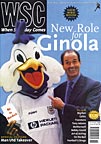 Boyd Hilton tells us why the widespread opinion of the ex-Arsenal boss is wide of the mark
Boyd Hilton tells us why the widespread opinion of the ex-Arsenal boss is wide of the mark
Anyone even vaguely interested in football thinks they know what George Graham stands for. So when Alan Sugar (allegedly vaguely interested in football) decides to bung George a few million, even he must have had a pretty good idea what he is going to get for his money. Sugar is investing in a pragmatic philosophy of winning at the expense of everything else. Success first, style second; the apparent opposite of the Spurs credo over the years.
However, having spent the Eighties and early Nineties watching George Graham gesticulating frantically in the dugout at Highbury, and occasionally looking at the football being played on the pitch, I feel that there are some myths that need to be exploded. The first is the notion that somehow George likes boring football; that he’s always been a big fan of long balls and offside traps and that he intrinsically distrusts “flair players”.
Let us not forget that twice under Graham Arsenal were top scorers in the League, with starring roles given to the likes of David Rocastle, Paul Davis, Anders Limpar, Paul Merson and Ian Wright. Sure, some of those stars were banished to the reserves for such sins as asking to go to the toilet during training, but during the heights of George’s reign at Highbury, Arsenal were, whisper it softly, an attractive team to watch.
The legend of George Graham’s “boring, boring” Arsenal was only really etched in stone in the later years of his rule. Once the triumvirate of Rocastle, Davis and Thomas had been dismantled, George seemed to settle for mind-numbing midfield mediocrity. He himself admitted as much, saying in August 1993: “The fans keep telling me about a midfield player. They’re telling me nothing I don’t already know. I’ve been searching for one for three years now.” What would he have given for Petit and Vieira?
In his autobiography Graham makes it clear he would have liked nothing better than to have signed the likes of Marc Overmars, Dennis Bergkamp and, yes, David Ginola, and only the strict wage structure imposed by the Arsenal board prevented him from doing so. Yet Graham still managed to get his increasingly mediocre team to triumph in Europe. “Winning isn’t just about pretty football,” he said, “it’s about hunger, application.”
Perhaps if Tottenham had been playing non-stop stylish football for the past ten years, one might understand the reluctance of some of their fans to accept that pragmatic philosophy. But they haven’t. Apart from a brief burst of hugely entertaining madness under Ossie Ardiles, Spurs fans have surely had to endure more banal football in recent times than George ever achieved at Highbury. The Gerry Francis years were like the myth of George Graham minus the trophies.
So will George throw Ginola out on his (no doubt perfect) arse? Will he have Sol Campbell organizing right-arm-raising sessions for the back four? Will he spend all Sugar’s money on giant central defenders? Whatever the details of George’s tactics over the coming months and years, Spurs fans can be sure of one thing – however scared they may be of what their new manager might do to their beloved Tottenham style, Arsenal fans are more scared, because we know what he is capable of achieving with the crappiest of teams. He is an alchemist who can turn footballing scrap metal into gold. That’s one thing about George Graham which isn’t a myth.
From WSC 141 November 1998. What was happening this month